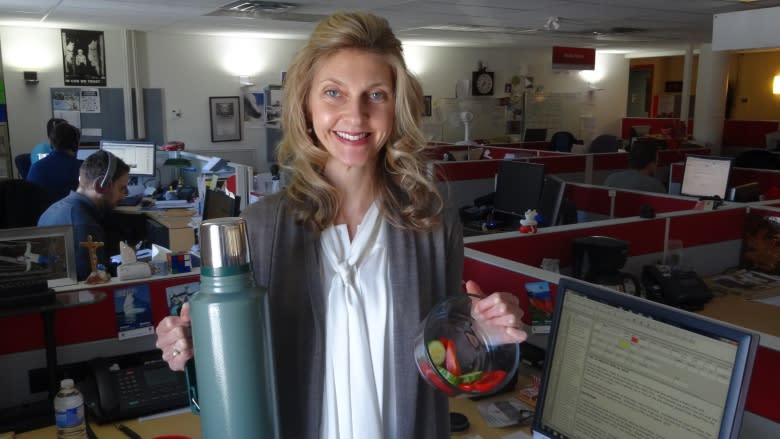Looking for a lifestyle change? Here are 15 health tips for 2015
Here we are again, ready to close the door on another year and embrace a brand new one.
I always feel a certain excitement about New Year's Eve.
The fireworks are a thrill, but it's also the idea that there's a clean slate stretched out in front of me and endless possibilities about how the coming year will unfold.
Resolutions are typically a part of most New Year's traditions.
Somewhere on your list there may be a commitment to be healthier.
With that in mind, I set out to find the Top 15 tips in nutrition, exercise and mental health to help you enjoy a fitter and happier 2015.
NUTRITION
A recent study published in the Canadian Medical Association Journal shows 71 per cent of people in Newfoundland and Labrador will be obese or overweight by the year 2019.
I don't know about you, but I find that prediction to be alarming.
Obesity can lead to high blood pressure, heart disease, diabetes and even cancer.
Our hospitals are already bursting at the seems.
What will they be like in 2019?
That's the scary bad news.
The good news is that changing what you eat can bring about dramatic improvements in health.
Tara Antle has seen it happen.
Antle is a nutritionist in St. John's and has been working in the field of nutrition for the past decade.
I asked her for her top five tips for better food choices and eating habits.
1. A balanced diet
Antle says eating too much of one thing or not enough of another can cause a lot of problems for people.
Her advice?
Have a good variety on your plate every time you eat.
"Ideally, what we want to aim for, as a visual, when you look at your plate, you want to make sure half that plate is vegetables, a quarter is protein and a quarter is your starch."
2. Thirsty? Drink water
Antle says to avoid sugary drinks and keep pop and coffee to a minimum.
She also says flavoured water is no substitute for the real thing.
"I think it's really important we get some good old fashioned water back into our systems. Ideally, 2 to 2.5 litres of water a day.
The No. 1 trigger for daytime fatigue is lack of water. Dehydration can cause headaches, muscle cramps, things like that as well."
3. Avoid "free" products
Antle recommends reducing fat-free, sugar-free and salt-free products.
"A lot of times we think that those products are a lot healthier. If something is taken out of a product, something else is added back in. Sometimes with fat-free products there's excessive amounts of sodium added back in.
"Sugar-free products are pretty trendy right now because everyone wants to avoid sugar. Typically, I try to avoid sugar-free products and 'no sugar' products as well, things like aspartame, sucralose and saccharin."
Antle says recent studies show artificial sweeteners can actually increase the risk of developing Type 2 diabetes.
4. Eat well, eat Often
Antle says we should be eating smaller meals every two to three hours throughout the day.
"When we go outside the three-hour window of not eating, the body actually switches gears and goes into starvation mode. When we're in starvation mode, it can make us feel tired, lethargic, cranky, irritable, a bit of brain fog sets in. It can actually increase the appetite and actually increase sugar cravings and increase the appetite so it makes us overeat as well. "
5. Check your source
If you're going to make a lifestyle change, Antle says to educate yourself.
"A lot of times we're following trends and fads it could be something that a celebrity put out. Double-check the credentials of the person who is actually delivering the message to you, because it could be something that I heard through the grapevine, it could be the push on the sale of a product."
EXERCISE
If you plan on getting moving in 2015, here's another disturbing fact that might motivate you even more: according to the Heart and Stroke Foundation, cardiovascular disease is the leading cause of death among Canadian men and women.
One-quarter of cardiovascular disease related deaths are the direct result of inactivity or lack of exercise.
Mike Wahl is director of fitness at Definitions Gym in St. John's. Wahl has advice for sticking with an effective fitness plan.
6. Slow and steady wins the race
Wahl says too many people push too hard, too fast when starting an exercise routine.
"When you give somebody a program that is too intense for them, it actually puts their body under more stress than they need and they actually get a lack of return."
Wahl says to start at a comfortable level and slowly work your way up over time.
7. Maximize effort — use big muscles
Too many people waste time when they're at the gym," explains Wahl.
He says the idea is to do as much as you can in a short period of time and to do that, you should use large muscle groups.
"When you are in there, don't stick to small muscle groups. You see people in there training their biceps and their arms and they spend a full hour doing that.
"I would suggest why not train a full body type program where you're using big muscles like your legs and then you go and you do big muscles like your chest and your back and you do a variety, when your legs are tired you can then exercise another muscle while they're actively recovering."
Wahl says larger muscles require more energy and so working them increases your metabolism to a greater degree.
8. Variety
If you do the same exercises at the gym every time, your body will get overused.
"Make sure you do a variety, that you use the machines one day, you try free weights another day, you use body weight another day. It keeps you more engaged and it's more entertaining because you're not doing the same thing, it's not as boring," says Wahl.
9. Fuel your body
Eating before a workout is critical.
Mike Wahl says if you don't fuel up, your body will actually use muscle mass as energy to get you through a workout.
"When you lose muscle mass you lower your metabolism, that actually is counter active and you might actually gain weight."
Eating after a workout is equally as important.
"Protein repairs muscles so make sure that your breakfast or your next meal has a protein source."
10. Get advice
To avoid injury, Mike Wahl suggests talking to an expert about a fitness program before you start.
MENTAL WELLNESS
If keeping a positive outlook in 2015 is on your resolution list, there are many ways to exercise mental wellness and for good reason.
The Canadian Mental Health Association says one in five Canadians will experience mental illness in their lifetime, eight per cent will experience a major depression.
The CMHA offers lifestyle tips for improving mental health.
Maureen Ennis says it was lifestyle change that helped her come out of a dark period.
Ennis is a well-known singer/songwriter in Newfoundland and Labrador.
Ennis also struggles with depression.
11. Eat well and exercise
Exercise boosts energy and lowers anxiety.
Maureen Ennis says she used to eat a lot of processed food and chose to eliminate it from her diet.
As for exercise, she tries to walk for an hour everyday.
"I don't have to go overboard but I feel really good at the end of that walk for a lot of reasons, I'm inspired. I think everybody needs to take an hour or two for themselves everyday.
"It keeps my depression at bay."
12. Get enough sleep
Sleeping well makes it easier to cope with stress, concentrate and think positively.
Ennis says she used to be a night owl.
She says changing her sleeping habit was a key part of coping with depression.
"I realized I'm not getting any vitamin D. I sleep all day and I'm up all night and that was causing a big issue with my depression."
13. Connect with others
The CMHA says it's important to reach out to people in our lives who support us, celebrate our successes and help us deal with our problems.
Maureen Ennis says her sisters provide her with a lot of encouragement.
"Sometimes, you know, just finding someone to talk to about a problem or talk it out and get some perspective on it is so important and just connecting with people sometimes just makes things feel not so heavy."
14. Volunteer
Being involved in community groups can give you a sense of purpose and satisfaction that paid work cannot.
Ennis says anytime she volunteers time to raise money for a worthy cause, the payoff is a huge boost in self-worth.
"There's a sense of accomplishment and you feel proud of just making the world a little better. That alone, just getting outside those thoughts in your head that you're not worth something, you are. Everyone can offer something to someone else."
15. Share humour and laugh more
Ennis says she thinks people often take themselves too seriously.
She describes herself as a perfectionist, but has learned to relax.
"You need to be able to brush off a mistake and know that you need to make mistakes to get better. We're not supposed to be perfect."
I think everyone would agree perfection is a hard goal to reach, especially when it comes to healthy living.
My hope for all of our cbc.ca/nl readers is that this list may help you along in making some improvements in 2015.
Happy new year and be well.



